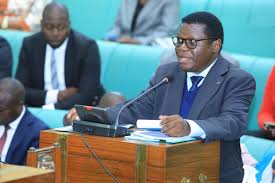Nsereko, Mpuuga Grill Minister Mao On Electoral Reforms
Kampala| FileFactsUg

Kampala Central MP Muhammad Nsereko and Democratic Alliance (DA) Coordinator Mathias Mpuuga have joined forces to push for crucial Constitutional and Electoral Reforms.
During a plenary session on February 6, 2025, presided over by Deputy Speaker Thomas Tayebwa, the duo questioned the Minister of Justice and Constitutional Affairs Nobert Mao on the government’s plan to table comprehensive reforms.
Nsereko emphasized the importance of addressing diaspora voting rights and the use of technology in elections.
“Ugandans in the diaspora have the desire to vote for their leaders, and I would like to know how far the government has reached with this…and that would bring the question of the Hon. Mathias Mpuuga that he has talked about on the comprehensive reforms that we need to address so that we have an election that is acceptable to all as the tool of democracy,” Nsereko said.
When he caught the speaker’s eye, Mpuuga reinforced Nsereko’s concerns, highlighting the need for transparency in the electoral process.
“Right Honourable Speaker, I am excited by the prospect of having the Hon Nobert Mao having to answer questions relating to transparency of elections,” Mpuuga stated.
“If the next general elections in any way become botched by virtue of a wrongly assembled register, he will be both a culprit and an abetter of that fraud. So, I am happy he is here to answer to these questions…,” he added.
Mpuuga further pressed Mao on the type of voter register that would be used in the 2026 elections, citing concerns about multiple voting.
“I have a few issues for him, right Honourable Speaker. What kind of register will finally come out of this process? Would it be biometric, or manual aware of the trouble we have had in the last series of elections courtesy of bearing different types of registers used concurrently at polling stations?” Mpuuga asked.
Mpuuga also questioned Mao on the issue of disenfranchising Ugandans in the diaspora and prisoners, citing a court ruling that declared this practice a violation of their rights.
“I want to be specific. The Hon. Mao is alive to the ruling in Karaari Steven Vs the Attorney General to which there was no appeal lodged by the Attorney General that the continuation of disenfranchising Ugandans in diaspora and prisoners is a serious violation of their right to exercise their civic rights,” Mpuuga asked Mao, “are you prepared to abet this illegality and violation of the constitution?”
Mpuuga further asked Mao about his previous enthusiasm for constitutional reforms and electoral reforms.
“I am aware some months back, the Hon Mao was very warm and enthusiastic about constitutional reforms and electoral reforms. And I am aware Minister Mao’s enthusiasm has since gone down allegedly he had a very good document on electoral and constitutional reforms, including the transition, and because of that last statement, some people broke into his office and stole everything…and he has nothing now to work with. May we know he is working on something fresh or he needs help to go back to his text that offered this country some glimmer of hope that we would transition?” Mpuuga said.
Mao’s Turn
Minister Mao responded, stating that the government is working on addressing diaspora voting rights. “It is a policy of the Government that the diaspora should vote. What we need to do is now to translate that policy into law,” Mao said.
He also mentioned that a bill on the use of technology in elections had been taken to the cabinet, but faced some reservations.
On the use of technology, Mao said, “I want to inform this house that we have already taken the bill to the cabinet, and the cabinet had some reservations and referred the bill to the committee which is chaired by Hon. Chris Baryomunsi. So, I hope on Monday [10th], he will report to cabinet.”
He explained, “the use of technology is very important to deal with the question of ballot staffing where people who never showed up at the polling station vote. In this case, the record in the machine should be carried in the ballot papers cast. We have even created an offence, a term of five years of imprisonment for any presiding officer under whose watch, the votes cast do not tally with the votes recorded in the machine.”
He also said, “we are even proposing body cameras so that whatever goes in the polling station can be on record.”
However, Mao was vague when it came to responding to Constitutional and electoral reforms, simply stating that the government was already working on them.
He obviously contradicted a statement made by Attorney General Kiryowa Kiwanuka just two days prior, where he informed the same parliament that he had not received instructions from Minister Mao to draft bills on these reforms.
Mpuuga’s push for reforms is part of the Democratic Alliance’s efforts to promote transparency and accountability in Uganda’s electoral process. As the country approaches the 2026 general elections, the need for comprehensive reforms has become increasingly urgent.
Thus, the Mpuuga-led civic platform has been vocal about the need for reforms and has proposed several key changes to the electoral process.
